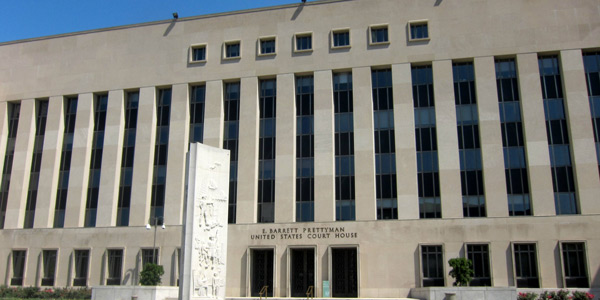[NOTE: This story was updated to include additional appeals filed after April 21.]
The battle over FERC’s order expanding PJM’s minimum offer price rule (MOPR) moved to the federal courts this week as environmental groups, electric cooperatives and state regulators filed petitions for appellate review.
The filings were set in motion by the commission’s April 16 orders denying rehearing of its June 2018 order that declared PJM’s capacity market unjust and unreasonable (EL16-49-001, et al.) and most of its December 2019 ruling, which directed PJM to expand the MOPR to all new state-subsidized resources (EL16-49-002, et al.).
Four environmental groups, the Natural Resources Defense Council, Sierra Club, Environmental Defense Fund and the Union of Concerned Scientists (UCS), filed a joint petition late Monday with the D.C. Circuit Court of Appeals. Also filing petitions with the D.C. Circuit were the North Carolina Electric Membership Corp. and the American Public Power Association (APPA), filing jointly with American Municipal Power.
The Illinois Commerce Commission filed a petition with the Seventh Circuit Court of Appeals in Chicago.
The New Jersey Board of Public Utilities and the Maryland Public Service Commission filed a joint petition with the D.C. Circuit on April 27 and Energy Harbor, the former FirstEnergy Solutions, weighed in on April 21.
John McCaffrey, APPA’s senior regulatory counsel, said he wasn’t certain if petitions would come from other organizations but noted that several other stakeholder groups previously filed protective appeals of the December order that were to be held in abeyance until after FERC’s ruling on rehearing.
State consumer advocates from New Jersey, Maryland, Delaware and D.C. asked the court on Feb. 29 to hold their petition for review in abeyance, acknowledging that it could be dismissed under the court’s “current precedent,” which holds that the commission’s rulings are not “final” orders ripe for judicial review while rehearing is pending. (See Consumer Advocates Appeal MOPR Order to DC Circuit.)
Also filing petitions for review in abeyance with the D.C. Circuit were the Natural Rural Electric Cooperative Association on March 31, Old Dominion Electric Cooperative on April 13 and the East Kentucky Power Cooperative on April 14.
As is customary, though, the petitions for review identify only the orders being challenged. The grounds for the challenges will be spelled out later in briefs. But the rehearing requests that FERC rejected outlined several potential lines of attack. One is whether the commission is intruding on state regulation of generation in violation of the Federal Power Act. The commission also is likely to be challenged on its decision to apply the MOPR to state-subsidized resources but not those benefiting from federal subsidies.
In a strongly worded joint press release, the environmental groups said the commission’s rulings could force 65 million customers in the Mid-Atlantic and Midwest to pay billions of dollars more for electricity while undermining state efforts to promote carbon-free resources.
“FERC has overstepped its jurisdiction with its reckless MOPR decision, which will worsen the dangerous health impacts of fossil fuel combustion in communities from Virginia to Illinois,” said Casey Roberts, senior attorney with the Sierra Club. “We plan to aggressively pursue FERC’s harmful orders through the courts, and to support states in exiting PJM’s capacity market so they can pursue the affordable clean energy policies needed to protect communities.”
Mike Jacobs, senior energy analyst at UCS said, “FERC’s choice to overlook numerous existing energy subsidies and attack states’ explicit efforts to reduce air pollution and carbon emissions is bad policy based on flawed and legally questionable reasoning. Every state in PJM has something to lose, and it’s a shame this must now be resolved in court.”
The court filings come even as PJM plans to implement the December order and reschedule the 2019 capacity auction. Comments on PJM’s compliance filing in response to the December order are due May 15.
In its ruling April 16, FERC agreed with PJM’s interpretation that voluntary renewable energy credits and participation in the Regional Greenhouse Gas Initiative will not subject capacity resources to the expanded MOPR. (See FERC: RGGI, Voluntary RECs Exempt from MOPR.)




